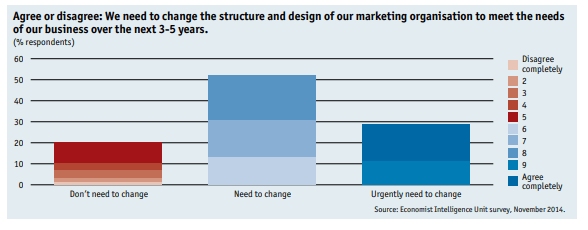
5 Positive changes for 2020
Unprecedented levels of change and disruption require new thinking and a transformative approach to growth.
Marketers have seen their jobs transformed over the past ten years. The transformation is happening again, but faster. According to the Economist Intelligence Unit’s survey of 478 high-level marketing executives worldwide, Marketers know they need to change to better support the business. And 29% believe the need for change is urgent.
Driving engagement, experience and revenue
Here are 5 trends to keep a close eye on in 2020.
This research was conducted by The Economist: The Intelligence Unit.
1. Marketing as a source of revenue.
The good news is that in 3 to 5 years, 80% of companies will classify the marketing function as a revenue driver.
Marketers are going deeper into the funnel, into what used to be the territory of sales. At most companies, business owners know that marketing drives revenue, but the view that marketing is a cost is just as widespread (especially in Europe). In three to five years, the view of marketing will change. It will less frequently (down by 3%) be seen as a cost centre and more often as a driver of revenue. The marketing function is slowly migrating from the cost side of the ledger to the revenue side.
2. Marketing takes the lead in customer experience.
By delivering a personal, memorable experience, companies create a distinct offering that engages customers and creates advocacy and loyalty. The customer experience is increasingly seen as a key to competitive advantage in every industry.
Slightly more than one-third of marketers polled say they are responsible for managing the customer experience today. However, over the next three to five years, 75% of marketers say they will be responsible for the end-to-end experience over the customer’s lifetime.
As responsibility for the customer experience shifts to marketing, it is moving away from customer support and sales. The distinction between sales and marketing—in which sales owns relationships and marketing owns messaging—has become less distinct. As consumers gain power and become less reliant on sales, the marketing function is increasingly orchestrating relationships
3. Engagement must be THE focus.
More than six of ten (63%) marketers polled agree that engagement is best reflected in customer renewals, retention and repeat purchases. Adding in the 15% who define engagement in terms of impact on revenue, a full 78% of marketers see it as occurring in the middle or later stages of the classic funnel.
Customer experience is the most exciting business opportunity for 2020 – not content, social media, or any other form of digital marketing.
4. Time to improve both operational and data skills.
The gap between what marketers used to do and what they need to do, has never been greater. Certain skills stand out:
- Marketing operations/Technology and digital engagement are first and second (39% each).
- A close third, and not significantly different, is strategy and planning (38% overall, and 44% among those who see urgency around restructuring their marketing efforts).
- Thirty-two per cent say they need skills in the areas of demand generation and data analysis.
- About 27% seek skills in the area of customer experience and engagement, though there is more demand (35%) among organisations with strength in marketing technology.
- Investment in demand and lead generation systems drives the need for engaging content and well-designed touchpoints.
5. Digital and data investments will be big.
Marketers’ technology investment plans illustrate both the dominance and fragmentation of digital channels. Three of the four most widely cited investments are aimed at reaching customers through different channels: via social networks, on mobile devices and on the old standby of e-mail. Because so much interaction occurs through these channels, they are a rich source of customer data.
Today, barely half of marketers use data to gain insights and engage customers. In three to five years, however, 81% say they will use data to better connect with customers. Similarly, over the next three to five years, more than 80% of marketers will rely on technology to engage customers in conversations and build advocacy and trust.
Technology investment plans by marketers illustrate both the dominance and fragmentation of digital channels. Three of the four most widely cited investments are aimed at reaching customers through different channels: via social networks, on mobile devices and on the old standby of e-mail. The fourth, analytics, is needed to knit together data from multiple channels into a coherent and actionable portrait of the consumer.
A big thank you to The Economist Intelligence Unit who conducted the research behind this. Click here to access and read their full findings.
Got any questions? We’re here to help. hello@visibly.rock.
“If you’re still thinking of the CMO as chief megaphone officer, then you’re stuck in the ’90s. Today, the primary task of CMOs is to deeply understand customer buying behaviour and intent; deeply understand the context of where someone is in their decision journey; be able to predict what they’re primed to do next; and be ready to influence them at the right moment.”
Jonathan Martin, CMO. Pure Storage.
